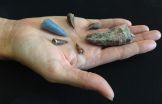(Press-News.org) The monoclonal antibody nivolumab achieves superior response rates and a longer duration of response than standard chemotherapy[1] in patients whose melanoma has progressed after treatment with ipilimumab, according to phase III data presented at the ESMO 2014 Congress in Madrid, Spain.
"Previously-treated advanced melanoma patients have limited options," says the study's principal investigator, Professor Jeffrey Weber, Director of the Donald A. Adam Comprehensive Melanoma Research Center of Excellence at the Moffitt Cancer Centre, Tampa, Florida.
Nivolumab is an antibody in a class of drugs called 'checkpoint inhibitors', that act to relieve a critical brake placed on the immune system by the tumour itself. The drug then reinvigorates patients' anti-tumour immune response and promotes shrinkage of the tumour.
In this first phase III trial of nivolumab among melanoma patients whose disease has progressed even after treatment with ipilimumab, 405 patients with unresectable metastatic melanoma were randomized in a ratio of 2:1 either to intravenous nivolumab (3 mg/kg) or the investigator's choice of chemotherapy regimens: dacarbazine (1000 mg/m2), or carboplatin AUC6 plus paclitaxel (175 mg/m2).
The primary endpoints of the study were objective response rate to treatment and overall survival, but researchers are also looking at the impact of treatment on secondary objectives of safety, progression-free survival, health-related quality of life and expression of the programmed death-1 ligand (PD-L1), which is the ligand of PD-1 targeted by nivolumab.
Preliminary data from a sub-group of the nivolumab-treated patients in the open-label trial show that nivolumab has markedly higher clinical activity with a 32% response rate, as well as lower toxicity compared to the chemotherapy reference arm, with a 11% response rate.
Treatment responses were also longer-lasting in the nivolumab group compared to the chemotherapy group, and there was a 31% incidence of higher-grade treatment-related side effects in the chemotherapy group compared to only 9% incidence in the nivolumab group.
"The impressive data on duration of response suggest that there will be significant prolongation of progression-free and overall survival when the analysis of those data is mature," says Weber.
In summary, Weber says, "The differences in response rate and toxicity markedly favour the use of the PD-1 blocking antibody nivolumab compared to results seen with chemotherapy in patients that have failed ipilimumab."
Commenting on the findings, Professor Olivier Michielin of the Department of Oncology, University of Lausanne, Switzerland, says, "These results add another piece of evidence that PD blockade is rapidly becoming a central part in our armamentarium against melanoma, progressively replacing chemotherapy with more effective and less toxic options."
"These results demonstrate that PD blockade, contrary to a common and old dogma of immunotherapy, can produce rapid and deep responses even in advanced and bulky disease. This opens exciting new opportunities to widen the scope of application of immuno-oncology for the treatment of stage IV melanoma," says Michielin.
INFORMATION:
Nivolumab shows signs of superior response rate compared to standard chemo in advanced melanoma
Preliminary data from a phase III trial suggest drug is well tolerated and leads to a sustained response in patients who have progressed after ipilimumab therapy
2014-09-29
ELSE PRESS RELEASES FROM THIS DATE:
New data on combination treatments for melanoma
2014-09-29
Combination therapy with both BRAF inhibitor vemurafenib and MEK inhibitor cobimetinib achieves greater progression-free survival and response rates than vemurafenib plus placebo in BRAF-mutation positive melanoma, according to phase III data presented at the ESMO 2014 Congress in Madrid, Spain.
"Before the results of this study, we knew that cobimetinib plus vemurafenib could be safely delivered together with highly promising rates of tumour shrinkage; however until the performance of a scientifically rigorous randomised trial the potential magnitude of this benefit ...
Studies report new findings on treatment options for mesothelioma
2014-09-29
Treating patients with high-dose radiotherapy after chemotherapy and surgery for malignant pleural mesothelioma does not achieve improvements in local relapse and overall survival, according to data from a prospective randomized phase II trial presented at ESMO 2014 Congress in Madrid.
"Mesothelioma remains a difficult disease to find better treatment options for, so we asked whether high-dose hemithoracic radiotherapy would decrease the rate or delay the time of local recurrence after chemotherapy and radical surgery," says lead author Prof Rolf A. Stahel, from the ...
Promising results shown with targeted approaches in subsets of non-small cell lung cancer
2014-09-29
The BRAF inhibitor dabrafenib has significant anti-tumour activity in patients with advanced BRAF V600E mutant non-small cell lung cancer whose disease has progressed after chemotherapy, according to phase II data presented at the ESMO 2014 Congress in Madrid, Spain.
"Reports of lung cancers bearing mutations in BRAF have generated considerable interest because these mutations may be associated with increased sensitivity to BRAF tyrosine-kinase inhibiting agents," says lead author Dr David Planchard, pulmonary oncologist at the Gustav-Roussy Cancer Campus, Paris, France. ...
Scientists make droplets move on their own
2014-09-29
Droplets are simple spheres of fluid, not normally considered capable of doing anything on their own. But now researchers have made droplets of alcohol move through water. In the future, such moving droplets may deliver medicines, etc.
To be able to move on your own – to be self-moving – is a feature normally seen in living organisms. But also non-living entities can be self-moving, report researchers from University of Southern Denmark and Institute of Chemical Technology in Prague, Czech Republic.
The researchers have made alcohol droplets move in a life-like way, ...
Avoid skunky beer this Oktoberfest with the help of chemistry
2014-09-29
WASHINGTON, Sept. 29, 2014 — Oktoberfest is here, and that means beer. And there's nothing worse than reaching for a cold one, taking that first sip and realizing your beer's been skunked: chemicals have reacted to form compounds that cause an awful, bitter taste. This week, Reactions explains why beers get skunky, and what you can do to keep your brews from going bad. Learn all about it at http://youtu.be/9i4dHdQzTFg.
INFORMATION:
Subscribe to the series at Reactions YouTube, and follow us on Twitter @ACSreactions to be the first to see our latest videos.
The American ...
Ancient human genome from southern Africa throws light on our origins
2014-09-29
What can DNA from the skeleton of a man who lived 2,330 years ago in the southernmost tip of Africa tell us about ourselves as humans? A great deal when his DNA profile is one of the 'earliest diverged' – oldest in genetic terms – found to-date in a region where modern humans are believed to have originated roughly 200,000 years ago.
The man's maternal DNA, or 'mitochondrial DNA', was sequenced to provide clues to early modern human prehistory and evolution. Mitochondrial DNA provided the first evidence that we all come from Africa, and helps us map a figurative genetic ...
DNA signature found in ice storm babies
2014-09-29
This news release is available in French. Montreal, September 29th, 2014 - The number of days an expectant mother was deprived of electricity during Quebec's Ice Storm (1998) predicts the epigenetic profile of her child, a new study finds.
Scientists from the Douglas Mental Health University Institute and McGill University have detected a distinctive 'signature' in the DNA of children born in the aftermath of the massive Quebec ice storm. Five months after the event, researchers recruited women who had been pregnant during the disaster and assessed their degrees of ...
Who are the men and boys suffering from anorexia?
2014-09-29
A new study by researchers from the University of Montreal reveals the current state of knowledge about anorexia in men and boys. "Most of the knowledge about anorexia pertains to females. However, about 10% of persons affected are males, and we believe this figure is underestimated," says Laurence Corbeil-Serre, lead author of the study. "Our results show that there appear to be similarities between the behavioural symptoms of males and females, but certain particularities can be identified in males, especially related to personality, gender identity, and sexual orientation."
The ...
Researchers show irradiation plus transplantation effective for treating HIV/AIDS
2014-09-29
Yerkes National Primate Research Center researchers are the first to show that an irradiation plus transplantation combination approach in nonhuman primates can be used to treat or even possibly cure HIV/AIDS, and this new model is providing some answers about the "Berlin patient," the only human thought cured of AIDS. The study is published in the September 25 issue of PLOS Pathogens.
Guido Silvestri, MD, division chief of Microbiology and Immunology at the Yerkes Research Center at Emory, and several of his research colleagues performed the first hematopoietic stem ...
Tooth buried in bone shows prehistoric predators tangled across land, sea
2014-09-29
About 210 million years ago when the supercontinent of Pangea was starting to break up and dog-sized dinosaurs were hiding from nearly everything, entirely different kinds of reptiles called phytosaurs and rauisuchids were at the top of the food chain.
It was widely believed the two top predators didn't interact much as the former was king of the water, and the latter ruled the land. But those ideas are changing, thanks largely to the contents of a single bone.
In a paper published online in September in the German journal Naturwissenschaften, Stephanie Drumheller of ...
LAST 30 PRESS RELEASES:
Emerging class of antibiotics to tackle global tuberculosis crisis
Researchers create distortion-resistant energy materials to improve lithium-ion batteries
Scientists create the most detailed molecular map to date of the developing Down syndrome brain
Nutrient uptake gets to the root of roots
Aspirin not a quick fix for preventing bowel cancer
HPV vaccination provides “sustained protection” against cervical cancer
Many post-authorization studies fail to comply with public disclosure rules
GLP-1 drugs combined with healthy lifestyle habits linked with reduced cardiovascular risk among diabetes patients
Solved: New analysis of Apollo Moon samples finally settles debate about lunar magnetic field
University of Birmingham to host national computing center
Play nicely: Children who are not friends connect better through play when given a goal
Surviving the extreme temperatures of the climate crisis calls for a revolution in home and building design
The wild can be ‘death trap’ for rescued animals
New research: Nighttime road traffic noise stresses the heart and blood vessels
Meningococcal B vaccination does not reduce gonorrhoea, trial results show
AAO-HNSF awarded grant to advance age-friendly care in otolaryngology through national initiative
Eight years running: Newsweek names Mayo Clinic ‘World’s Best Hospital’
Coffee waste turned into clean air solution: researchers develop sustainable catalyst to remove toxic hydrogen sulfide
Scientists uncover how engineered biochar and microbes work together to boost plant-based cleanup of cadmium-polluted soils
Engineered biochar could unlock more effective and scalable solutions for soil and water pollution
Differing immune responses in infants may explain increased severity of RSV over SARS-CoV-2
The invisible hand of climate change: How extreme heat dictates who is born
Surprising culprit leads to chronic rejection of transplanted lungs, hearts
Study explains how ketogenic diets prevent seizures
New approach to qualifying nuclear reactor components rolling out this year
U.S. medical care is improving, but cost and health differ depending on disease
AI challenges lithography and provides solutions
Can AI make society less selfish?
UC Irvine researchers expose critical security vulnerability in autonomous drones
Changes in smoking status and their associations with risk of Parkinson’s, death
[Press-News.org] Nivolumab shows signs of superior response rate compared to standard chemo in advanced melanomaPreliminary data from a phase III trial suggest drug is well tolerated and leads to a sustained response in patients who have progressed after ipilimumab therapy


